新概念英语第二册An exciting trip课件(共19张PPT)
文档属性
| 名称 | 新概念英语第二册An exciting trip课件(共19张PPT) |
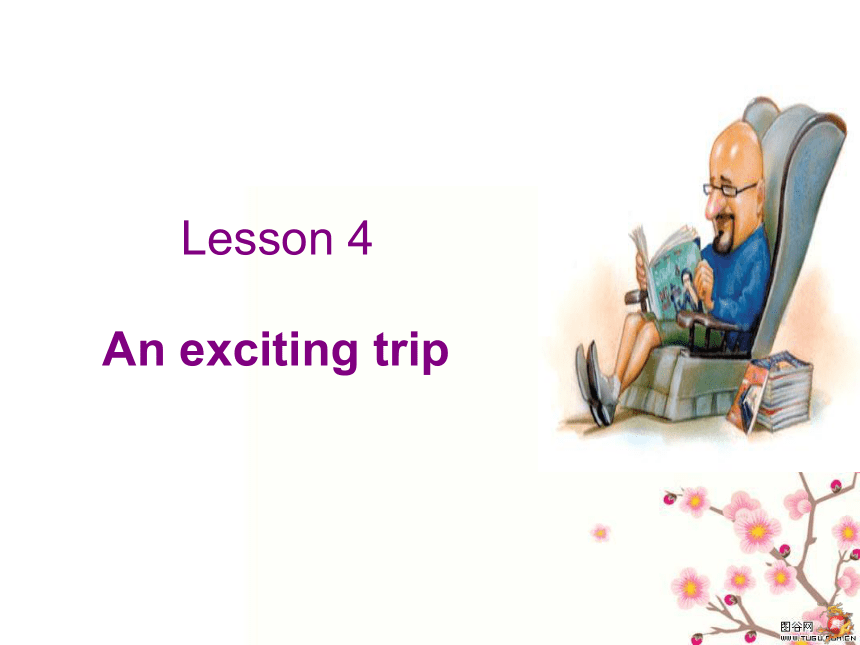
|
|
| 格式 | ppt | ||
| 文件大小 | 434.5KB | ||
| 资源类型 | 教案 | ||
| 版本资源 | 新概念英语 | ||
| 科目 | 英语 | ||
| 更新时间 | 2023-10-06 00:00:00 | ||
图片预览

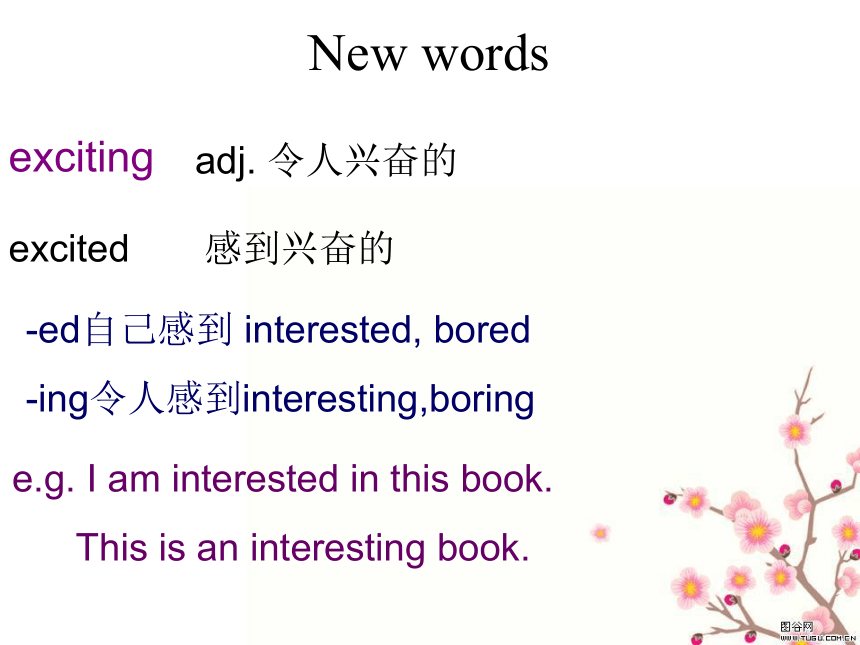
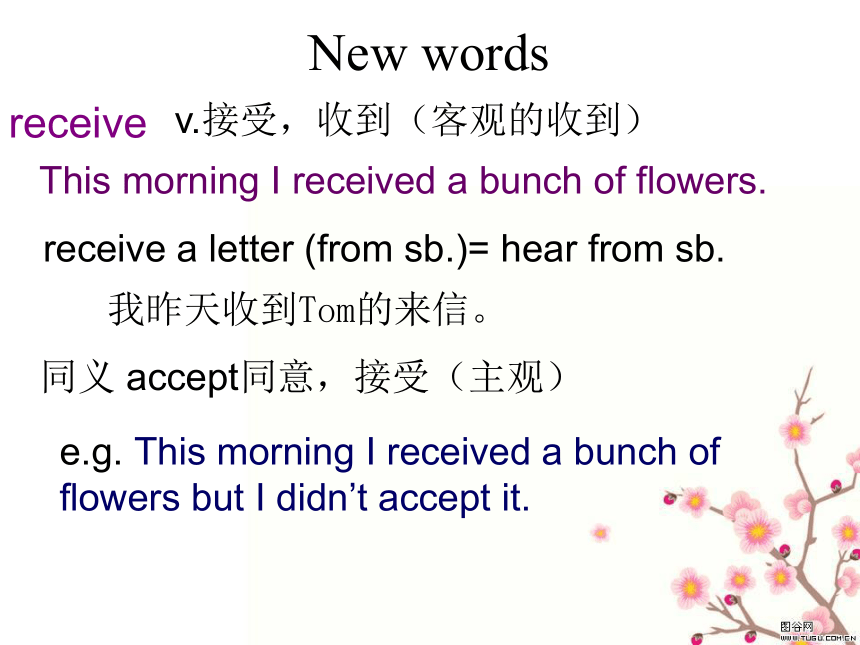
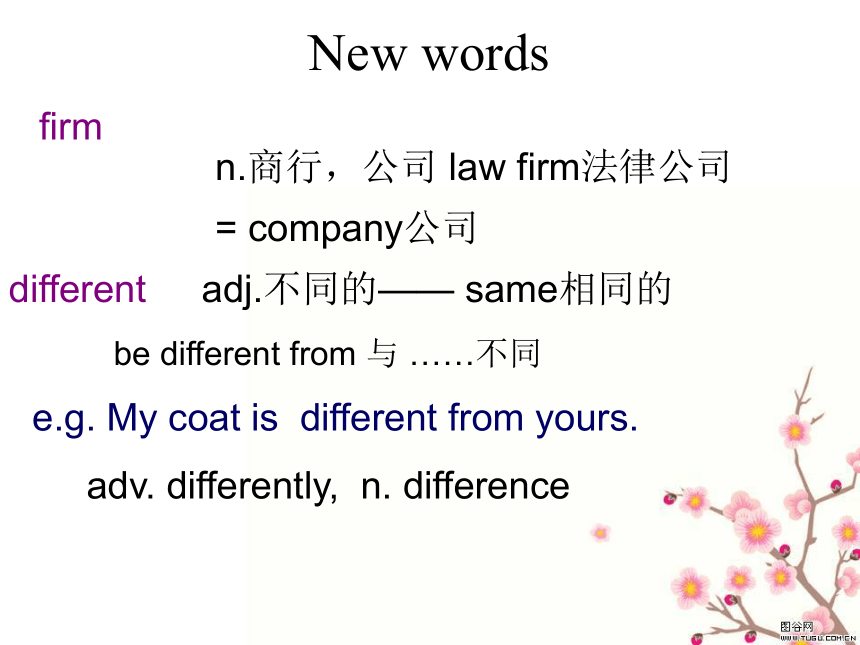
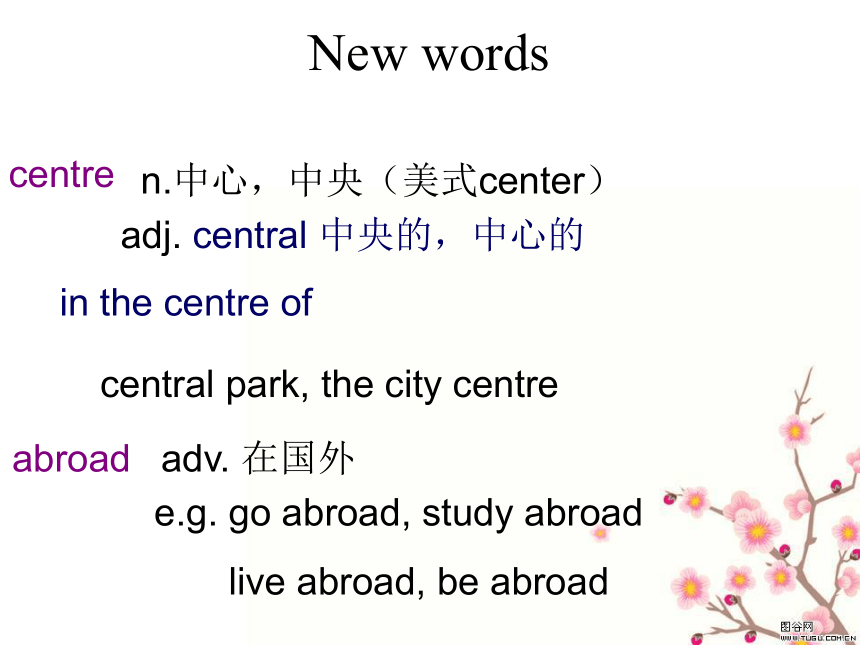
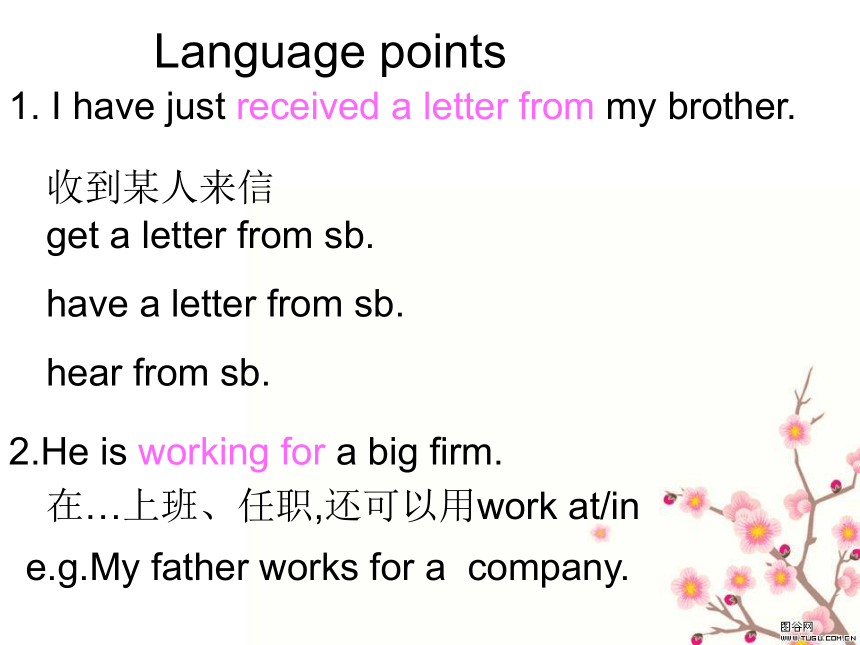
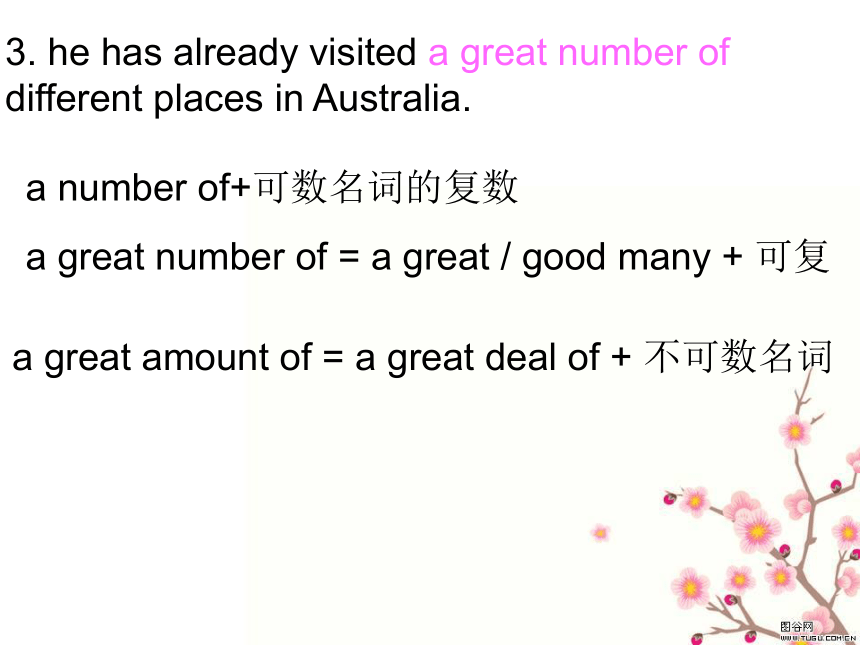
文档简介
(共19张PPT)
Lesson 4
An exciting trip
New words
exciting
adj. 令人兴奋的
excited 感到兴奋的
-ed自己感到 interested, bored
-ing令人感到interesting,boring
e.g. I am interested in this book.
This is an interesting book.
v.接受,收到(客观的收到)
receive a letter (from sb.)= hear from sb.
同义 accept同意,接受(主观)
e.g. This morning I received a bunch of flowers but I didn’t accept it.
receive
New words
This morning I received a bunch of flowers.
我昨天收到Tom的来信。
New words
firm
n.商行,公司 law firm法律公司
= company公司
different
adj.不同的—— same相同的
adv. differently, n. difference
e.g. My coat is different from yours.
be different from 与 ……不同
New words
centre
n.中心,中央(美式center)
adj. central 中央的,中心的
in the centre of
central park, the city centre
abroad
adv. 在国外
e.g. go abroad, study abroad
live abroad, be abroad
Language points
1. I have just received a letter from my brother.
收到某人来信
2.He is working for a big firm.
get a letter from sb.
have a letter from sb.
hear from sb.
在…上班、任职,还可以用work at/in
e.g.My father works for a company.
3. he has already visited a great number of different places in Australia.
a number of+可数名词的复数
a great number of = a great / good many + 可复
a great amount of = a great deal of + 不可数名词
Language points
4. He has just bought an Australian car and has gone to Alice springs.
He has gone to the south.(还没回来或在路上)
He has been to the south.(去过:已回来)
I have ___ to Beijing twice.
Sorry. He isn't at home. He has ____ to Beijing
5. He is finding this trip very exciting.
find+n+adj.觉得…怎么样
e.g.
I find the film disappointing
He finds the book very interesting
3. We find him great.
4.I find the flowers beautiful.
now
past
future
一般过去时
一般过去时表示的是纯粹在过去发生的事情或过去某时发生的动作
现在完成时表示的是在过去某个时间开始并持续到现在的动作/状态,或者发生在过去却对现在造成的影响
Grammar
I saw this film yesterday.
(强调看的动作发生过了。)
I have seen this film. (强调对现在的影响,电影的内容已经知道了.)
基本结构
一般过去时的时间状语: yesterday, last … ,…ago, in1990, in October, just now, …
时间状语
现在完成时的时间状语: for, since, so far/ up to now/ by now, never, ever, just, already, yet, recently/ lately ,动作发生的次数…
--Will you go shopping with me now
--Sorry, I can’t. I _____ my shirts.
A wash B have washed
C washed D am washing
How long have you ______ the magazine
About a week.
A found B borrowed C received D had
____ you _____ the film Harry Potter 5
Not yet. I will see it this Sunday.
A Did, see B Are, seeing
C Have, seen D Do, see
How is Ann I ____ her for a long time.
A don’t see B won’t see
C didn’t see D haven’t seen
Hasn’t Betty come yet
No, and I ____ for her for nearly 2 hours.
A wait B waited C have waited D had waited
Is Mr Baker at home
Sorry, he isn’t in. He ____ Dalian for vacation.
A has gone B went C is going D goes
Mr Zhang is a teacher of rich experience. He ___ English for 20 years.
A has taught B will teach
C teaches D taught
--How many times have you ____ to Xi’an
--Three times.
A been B went C gone D go
I won’t forget my teacher because she ____ so kind to me since I came to this school.
A has been B will be C was D is
He _____ our school for two weeks.
A left B has left C has been away from
-- My father ____Shanghai with my grandparents.
--Really ____ will they come back
A has been to, How soon B has gone to, How soon C has been to , How long D has gone to, How long
She ___ that same song so many times. I’m getting sick of it!
A sings B sang C will sing D has sung
--Mike, you ___ the magazine since last week. Can you return it now
--Sure.
A borrowed B have borrowed C have kept
Lesson 4
An exciting trip
New words
exciting
adj. 令人兴奋的
excited 感到兴奋的
-ed自己感到 interested, bored
-ing令人感到interesting,boring
e.g. I am interested in this book.
This is an interesting book.
v.接受,收到(客观的收到)
receive a letter (from sb.)= hear from sb.
同义 accept同意,接受(主观)
e.g. This morning I received a bunch of flowers but I didn’t accept it.
receive
New words
This morning I received a bunch of flowers.
我昨天收到Tom的来信。
New words
firm
n.商行,公司 law firm法律公司
= company公司
different
adj.不同的—— same相同的
adv. differently, n. difference
e.g. My coat is different from yours.
be different from 与 ……不同
New words
centre
n.中心,中央(美式center)
adj. central 中央的,中心的
in the centre of
central park, the city centre
abroad
adv. 在国外
e.g. go abroad, study abroad
live abroad, be abroad
Language points
1. I have just received a letter from my brother.
收到某人来信
2.He is working for a big firm.
get a letter from sb.
have a letter from sb.
hear from sb.
在…上班、任职,还可以用work at/in
e.g.My father works for a company.
3. he has already visited a great number of different places in Australia.
a number of+可数名词的复数
a great number of = a great / good many + 可复
a great amount of = a great deal of + 不可数名词
Language points
4. He has just bought an Australian car and has gone to Alice springs.
He has gone to the south.(还没回来或在路上)
He has been to the south.(去过:已回来)
I have ___ to Beijing twice.
Sorry. He isn't at home. He has ____ to Beijing
5. He is finding this trip very exciting.
find+n+adj.觉得…怎么样
e.g.
I find the film disappointing
He finds the book very interesting
3. We find him great.
4.I find the flowers beautiful.
now
past
future
一般过去时
一般过去时表示的是纯粹在过去发生的事情或过去某时发生的动作
现在完成时表示的是在过去某个时间开始并持续到现在的动作/状态,或者发生在过去却对现在造成的影响
Grammar
I saw this film yesterday.
(强调看的动作发生过了。)
I have seen this film. (强调对现在的影响,电影的内容已经知道了.)
基本结构
一般过去时的时间状语: yesterday, last … ,…ago, in1990, in October, just now, …
时间状语
现在完成时的时间状语: for, since, so far/ up to now/ by now, never, ever, just, already, yet, recently/ lately ,动作发生的次数…
--Will you go shopping with me now
--Sorry, I can’t. I _____ my shirts.
A wash B have washed
C washed D am washing
How long have you ______ the magazine
About a week.
A found B borrowed C received D had
____ you _____ the film Harry Potter 5
Not yet. I will see it this Sunday.
A Did, see B Are, seeing
C Have, seen D Do, see
How is Ann I ____ her for a long time.
A don’t see B won’t see
C didn’t see D haven’t seen
Hasn’t Betty come yet
No, and I ____ for her for nearly 2 hours.
A wait B waited C have waited D had waited
Is Mr Baker at home
Sorry, he isn’t in. He ____ Dalian for vacation.
A has gone B went C is going D goes
Mr Zhang is a teacher of rich experience. He ___ English for 20 years.
A has taught B will teach
C teaches D taught
--How many times have you ____ to Xi’an
--Three times.
A been B went C gone D go
I won’t forget my teacher because she ____ so kind to me since I came to this school.
A has been B will be C was D is
He _____ our school for two weeks.
A left B has left C has been away from
-- My father ____Shanghai with my grandparents.
--Really ____ will they come back
A has been to, How soon B has gone to, How soon C has been to , How long D has gone to, How long
She ___ that same song so many times. I’m getting sick of it!
A sings B sang C will sing D has sung
--Mike, you ___ the magazine since last week. Can you return it now
--Sure.
A borrowed B have borrowed C have kept
同课章节目录
